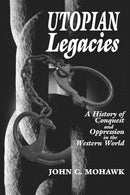Description
Utopian Legacies: A History of Conquest and Oppression in the Western World by John Mohawk. The Seneca scholar is professor of history in the American Studies Department at the State University of New York at Buffalo. His other works include Exiled in the Land of the Free and A Basic Call to Consciousness. In this work, he takes the long view of history by examining the underlying philosophy of Western culture. He examines the utopian ideal in religion and philosophy as it relates to religious wars, oppression of Indigenous peoples, genocide, economic domination, slavery, and world conquest from the time of the ancient Greeks and Romans up to the modern era of world wars and ethnic cleansing. The utopian ideal is not the problem but the danger lies in its application by dominant cultures that seek to force their view of truth and their way of life on other cultures and nations. The historical narrative begins with an introduction to utopia and its pursuit by ancient Greeks and Romans. Chapters are devoted to Imperial Christendom in the Middle Ages, New World Silver and the Origins of Money, Nationalism and the Rise of Representative Government, and European Expansion in North America. This chapter covering the arrival of Europeans in North America is a well-written, succinct overview of the contact period between Native Americans and the Spanish, French, and British newcomers. Additional chapters discuss slavery and abolition in America, the Holocaust, and World War ll. Throughout this legacy of conquest and oppression, the author makes it clear the utopian legacy continues to impact contemporary governments and political movements. John Mohawk effectively argues that peace and understanding among the various peoples of the world are possible. He challenges governments and cultures to find methods to diffuse the devastating impact of the utopian legacy. He believes that this is achievable by adopting a pluralistic viewpoint. This book makes stimulating reading for anyone interested in Indigenous People, world history, and politics. A hardcover edition is also available.


